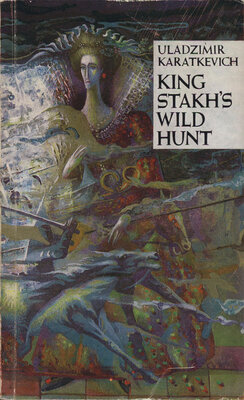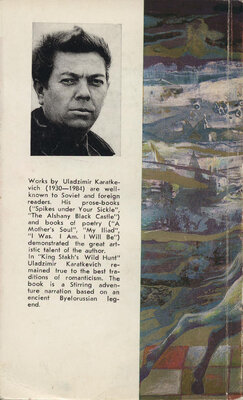King Stakh's Wild Hunt
Уладзімір Караткевіч
Выдавец: Мастацкая літаратура
Памер: 248с.
Мінск 1989
I decided that it had to lead somewhere and gave myself up to fate. And indeed, when about thirty minutes had passed, ahead of us in this dank and pitch-dark night a warm and beckoning light appeared.
We soon saw that it was not a woodsman’s hut and not a tarsprayer’s hut as I had thought at first, but some kind of a tremendous building, a building too large even for the city. In front of us — a flower-bed, a black opening in the fir-tree lane through which we had come, and all around wet grass.
The entrance had a kind of high roof over it, on the door there was a heavy bronze ring.
At first I and then the coachman, then again I, knocked on the door with this ring. We rang timidly, knocked a little louder, beat the ring very bravely, stopped, called, then beat the door with our feet — but to no avail. At last we heard somebody moving behind the door, uncer
tainly, timidly. Then from somewhere at the top came a woman’s voice, hoarse and husky:
“Who’s there?”
“We’re travellers, dear lady, let us in.” “You aren’t from the Hunt, are you?” “Whatever hunt are you speaking of? We’re wet through, from head to foot, can hardly stand on our feet. For God’s sake let us in.”
The woman remained silent, then in a hesitating voice:
“But whoever are you? What’s your name?” “Belaretzky is my name. I’m with my coachman.”
“Count Belaretzky?”
“I hope I am a Count,” I answered with the plebian’s lack of reverence for titles.
The voice became severe:
“Well then, go your way, my good man, back to where you came from. Just think of it! He hopes he is a Count! Jokes in the night? Come on, off with you! Go back and look for some lair in the forest, if you’re such a smart fellow.”
“My dear lady,” I begged, “gladly would I look for one and not disturb people, but I am a stranger in these parts. I’m from the district town, we’ve lost our way, not a dry thread on us.”
“Away, away with you!” answered an inexorable voice.
In answer to that, anybody else in my place would have probably grabbed a stone and begun beating on the door with it, swearing at the cruel owners, but even at such a moment I could not rid myself of the thought it was wrong to break into a strange house. Therefore I only signed and turned to the coachman.
“Well then, let’s leave this place.”
We were about to return to our carriage, but our ready agreement had apparently made a good impression, for the old woman softening, called after us:
“Just a moment, wayfarers, but who are you, anyway?”
I was afraid to answer ”an ethnographer”, because twice before after saying this I had been taken for a bad painter. Therefore I answered:
“A merchant.”
“But how did you happen into the park when a stone wall and an iron fence encircle it?”
“Oh! I don’t know,” I answered sincerely. “We were riding somewhere through the marsh, fell somewhere through somewhere, we hardly got out... Something roared there...” Truth to tell, I had already given up all hope, however, after these words of mine the old woman quietly sighed and said in a frightened voice:
“Oh! Oh! My God! Then you must have escaped through the Giant’s Gap, for it’s only from that side that there’s no fence. That’s how lucky you were. You’re a fortunate man. The Heavenly Mother saved you! Oh! Good God! Oh! God’s martyrs!”
And such sympathy, and such kindness were heard in those words, that I forgave her the hour of questioning at the entrance. The woman thundered with the bolts, then the door opened, and a dim orange-coloured stream of light pierced the darkness of the night.
A woman stood before us, short of stature, in a dress wide as a church bell with a violet-coloured belt, a dress which our ancestors wore in the times of King Sas, and on her head was a starched cap. The face was covered with kind wrinkles, the nose hooked, the mouth im-
mence — resembling a nutcracker, the lips slightly protruding. She was round like a small keg, of medium height, with plump little hands, as if she were asking to be called “Mother dear”. In the hands of this old woman there were tremendous oven prongs: a weapon to defend herself with! I was about to burst into laughter, but remembered in time the cold outside and the rain, and kept silent. How many people even to this very day keep from laughing at things deserving to be laughed at, fearing the rain outside?
We went into a little room where it smelled of mice, and immediately pools of water ran down from our clothes onto the floor. I glanced at my feet and was horrified: almost up to my knees there was a brown mass of mud that looked like boots.
The old woman only shook her head.
“You, Mr. Merchant, must light a big candle as an offering to God for having escaped so easily!”. And she opened a door leading into a neighbouring room where the fireplace was lit. “You’ve had a narrow escape. Take off your clothes, dry yourselves. Have you any other clothes to get into?”
My sack luckily was dry. I changed my clothing before the fireplace. Our clothes — mine and the coachman’s — the woman dragged away somewhere and returned with dry clothing for the coachman. She came in paying no attention to the coachman being quite naked, standing bashfully with his back turned to her.
She looked at his back that had turned blue and said disapprovingly:
“You, young man, don’t turn your back to me,
I’m an old woman. And don’t squeeze your toes. Here, take these and dress yourself.”
When we had somewhat warmed up at the fireplace, the old woman looked at us with her deep sunken eyes and said:
“Warmed up a bit? Good! You, young man, will go to sleep with Yan, it won’t be comfortable for you here... Yan!”
Yan appeared. An almost blind old man about 60 years of age, with long grey hair, a nose as sharp as an awl, sunken cheeks, and a moustache reaching down to the middle of his chest.
At first 1 had been surprised that the old woman, alone with oven prongs in her hands, had not been afraid to open the door to two men who had appeared in the night from no one knew where, but after I had seen Yan, I understood that he had been somewhere in hiding and she had depended on him for help.
The help was “just grand”: in the hands of the old man I saw a gun. To be exact, it wasn’t a gun: “a musket” would be a more correct name for the weapon the man was holding. It was approximately six inches taller than Yan himself, the gun barrel had notches in it and was bell-shaped at the end, the rifleslock and butt-stock were worn from long handling, the slow match was hanging down. In a word its place was in an Armoury Museum. Such guns usually shoot as do cannon, and they recoil on the shoulder with such force that a person unprepared for the shock drops down like a sheaf on the ground.
And for some reason or other I thought with pleasure of the marvelous English six-shooter that was in my pocket.
Hardly able to move his unbending legs, Yan
led the coachman to the door. I noticed that even his hands were trembling.
“Dependable aid for the mistress,” I thought.
But the mistress touched me by the shoulder and invited me to follow after her into the “apartments”. We passed through yet another small room, the old woman opened another door, and I quietly gasped in surprise and delight.
Meeting our gaze was a great entrancehall, a kind of a drawing-room, a customary thing in ancient castles. And oh! The beauty there!
The room was so enormous that my gloomy reflection in the mirror somewhere on the opposite wall seemed no bigger than the joint of my little finger. The floor was made of oak “bricks” already quite worn, the exceptionally high walls were bordered at the edges with shining fretwork blackened by the years, the windows almost under the ceiling, small ones in deep lancet niches.
In the dark we had evidently hit on a side porch, for to the right of me was the front entrance: a wide door, also a lancet one, divided by wooden columns into three parts. The flowers, leaves and fruit carved on the columns were cracked with time. Behind the door in the depth of the vestibule was the entrance door,— a massive, oak door, bound by darkened bronze nails with square heads. And above the door an enormous dark window into the night and darkness. On the window a ship of forged iron, a masterpriece of workmanship.
I walked along the hall in amazement: what splendour, and how all had been neglected due to people’s carelessness. There was massive furniture along the walls — it squeaked even
in answer to footfalls. Here an enormous wooden statue of St. George, one of the somewhat naive creations of the Byelorussian national genius, and at the feet of the statue a layer of white dust, as if someone had spread flour over it; this unique work had been spoiled by woodlice. And here hanging down from the ceiling was a chandelier, also of surprising beauty, but with more than half of its pendants missing.
It might have seemed that no one lived here, were it not for an enormous fireplace, its flames lighting up the entrance-hall with an uncertain flickering light.
Almost in the middle of this splendid entrance-hall a marble staircase led up to the first floor, where everything was almost the same as on the ground floor — the same enormous room, even a similar fireplace also lit, except that on the walls the black wood (probably oak) alternated with shabby coffee-coloured damask wall-paper and on this wall-paper in all their splendour were portraits in heavy frames. And in addition near the fireplace there stood a small table and two armchairs.
The old woman touched me by the sleeve:
“Now I’ll lead you to your room. It’s not far from here along the corridor. And afterwards... perhaps you would like to have supper?”
I did not refuse, for I hadn’t eaten anything all day.
“Well then, sir, wait for me...”
She returned in about 10 minutes, a broad smile on her face, and in a confidential tone said to me:
“You know the village goes to bed early. But we here don’t like to sleep, we try to go to bed as late as possible. And the mistress doesn’t like visitors. I don’t know why she suddenly con
 КНІГІ ОНЛАЙН
КНІГІ ОНЛАЙН


